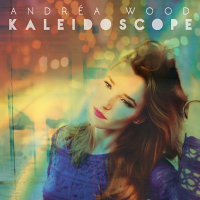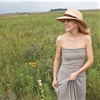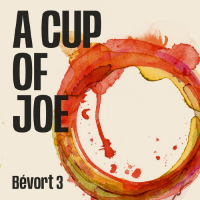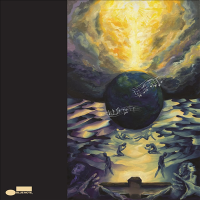Home » Jazz Articles » Bailey's Bundles » Christmas 2015 II: Classical
Christmas 2015 II: Classical
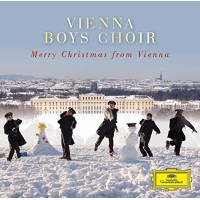 Vienna Boys Choir
Vienna Boys ChoirMerry Christmas from Vienna
Deutsche Grammophon
2015
As iconic is the Vienna Boys Choir, it is hard to believe that they do not release a holiday offering each year. Groups like Mannheim Steamroller and Trans Siberian Orchestra have made a cottage industry out of Christmas music. It is banal and sterile, technique over emotion. At least we can count on the Vienna Boys Choir to present us with something traditional and welcome. Or can we? The broadest praise I can give the newly minted Merry Christmas from Vienna is that there is something here to please anyone.
That said, VBC perform best the traditional music here. "Adeste Fideles," "Fröhliche Weihnacht Überall," and "O Holy Night" (performed with tenor Rolando Villazón) all sparkle with cheer. But the more contemporary "Have Yourself a Merry Little Christmas," "Winter Wonderland," and "Jingle Bells" are better left to the pop artists. And "Let is Snow," "Jingle Bell Rock,"and "Feliz Navidad" would have been best left alone altogether. The genre translation is both inferior and incomplete. Many will find this recording perfectly delightful and for good reason, the Vienna Boys Choir is something special. For the more traditionally-minded, I would suggest Vienna Boys' Choir: Christmas Favorites (Cobra, 2010).
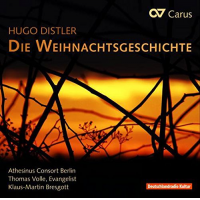 Athesinus Consort Berlin, Thomas Volle, Klaus-Martin Bresgott
Athesinus Consort Berlin, Thomas Volle, Klaus-Martin BresgottHugo Distler: Die Weihnachtsgeschichte
Carus Records
2015
Twentieth Century German choral composer Hugo Distler (1908-1942) took inspiration for his greatest composition, Die Weihnachtsgeschichte (The Christmas Story), from Seventeenth Century German choral composer Heinrich Schütz, composed his own setting of the Nativity, Weihnachtshistorie. Schütz's work is considered an Historia, a setting of the Gospel intended to be performed during a service, replacing the Gospel reading. Distler composed his Christmas setting for 4-part a capella choir and four soloists. Distler interspersed within his composition seven chorale stanzas of the Sixteenth-Century "Es ist ein Ros entsprungen) ("Lo, How a Rose E'er Blooming") and then riffed (a jazz word) off the 600-year old melody for the body of the piece. What that effectively does is make the modern composition familiar in an old way.
Distler scored much of his choral music in German, Die Weihnachtsgeschichte being no exception. I have never found German to be the most attractive language for singing... and that makes my position a petty prejudice. It was the Germans, after all, that gave us the Christmas Tree (Weihnachtsbaum or Christbaum or "Tannenbaum") and what we consider our modern way of celebrating the season, so, to be sure, they are experts on the subject. Distler's Die Weihnachtsgeschichte is a modern masterpiece well treated by choral master Klaus-Martin Bresgott and his Athesinus Consort Berlin.
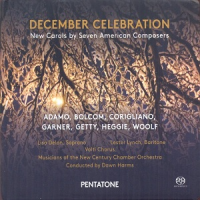 Lisa Delan, Lester Lynch, Volti Chorus, New Century Chamber Orchestra, Dawn Harms
Lisa Delan, Lester Lynch, Volti Chorus, New Century Chamber Orchestra, Dawn HarmsDecember Celebration: New Carols by Seven American Composers
Pentatone Records
2015
Have you ever wondered what makes a song a holiday classic? Subject matter is a given. Longevity is another thing, as it is for anything to become a classic. Easy to sing, but this is a hallmark of any well-crafted song, or put another way, it must contain a monster hook. Popularity is another thing, but this is the element that can kill the deal also. Mel Torme's exquisite "The Christmas Song" or Elvis Presley's pornography-soundtrack "Blue Christmas" are equally memorable and popular. There is no accounting for taste (or the lack thereof).
For the longest time I have thought that Vince Guaraldi's "Lucy and Linus" was the last great holiday song composed (notable as this year being its Golden Anniversary, A Charlie Brown Christmas debuted in 1965). But I am still missing something...the difference between holiday carols and holiday songs. Georg Frederic Handel's "Joy to the World" is a holiday carol, while "It's the Most Wonderful Time of the Year" is a holiday song. The difference is the previously mentioned subject, carols being the domain of the Biblical Nativity story and songs being something commercially-invented for the season.
My Obligatory Defense of Christmas. The Japanese celebrate Christmas with great fervor while being largely non-Christian (Shinto, Buddhism, and Confucianism). They celebrate Christmas as a great event -a great Western Civilization event that they have assimilated into their own culture. That said, the Christmas Holidays celebrate one thing, whether one likes it or not, whether we believe in the Tooth Fairy or the Conservation of Energy. It celebrates 2000 years of Christian history. History. Accept or don't, this history is a genetic element of our very being. Believe or not, denying it is as sensible as denying climate change or the superiority of women.
What December Celebration does is challenge seven contemporary American composers to add to the Christmas Carol Canon (avoid alliteration in writing, pshaw!). Centering on four Christmas Carols composed by Gordon Getty (1933), this collection is, at once thoroughly modern and utterly simple and ancient. Getty composes in an old style while, Joan Morris' and William Bolcom's "Carol (Neighbors on this Frosty Tide) is what I call a Christmas Carol! Enfante Terrible cum master John Corigliano's "Christmas at the Cloisters" proves high art. Most of this release will challenge the listener. However, the SACD-quality sound is unsurpassed and how many times can we possibly hear "Christmas in Africa?"
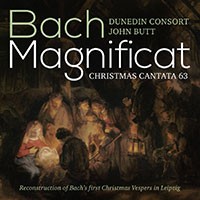 Dunedin Consort John Butt
Dunedin Consort John ButtBach: Manificat—Christmas Cantata 63
Linn Records
2015
Old man Bach, firebrand Lutheran he was, knew how to detonate a musical bomb when necessary. Johann Sebastian Bach was all business, and unlike his great antithesis and contemporary, Georg Fredric Handel, he never veered from soli deo Gloria (though, to be fair to Handel, he was devout with a simple faith, I cite Messiah for those with doubts). New York Times Classical Critic Harold C. Schoenberg, referred to Bach as the "Transfiguration of the Baroque." "Transfiguration" unpacks to, "the supernatural and glorified change in the appearance of Jesus on the mountain as reported in Matthew 17:1—9." This is appropriate as what emerged from the Renaissance with Claudio Monteverdi (1567-1643) and Antonio Vivaldi (1678 —1741) was brought to Christian perfection by Bach (1685-1750). We would not be, as a civilization, without Bach.
Break to the 21st Century and Scotsman, John Butt. Here is a musicologist who has doubled down on the period-instrument/period-performance universe, taking it one better. He is not only interested in hearing how the music sounded, in period, with the proper instruments and performance practice. He has made a recording career of attempting to approximate what the music sounded like at its debut. His results have been impressive. His 2006 reconstruction of the premiere of Handel's Messiah (Linn) is transformative. Brisk tempi and a buttery tenor, this is how Christ would hear it. Butt's recreation of Mozart's Requiem as thought to have been performed at the composer's funeral in 1791 is similarly transfixed.
So, how of Father Bach at his first Christmas in Leipzig in 1723? Well, Butt burns the barn with an exact and accurate statement of the evening. Bach opens things with a Gabrieli Motet, "Hodie, Christus natus est." Bach easily performed music of his contemporaries as he stole fro them, Following, is a performance of the Christmas Cantata, "Christen, atzet diesen Tag," a couple of organ chorales and then, "My Soul Doth Magnify the Lord..." and he is off...both Bach and Butt. A welcome performance that is warm as eggnog and as bracing as Keat's "The Eve of St. Agnes." Enjoy this with a hearty and warm glass of Glühwein, because Bach was as lusty as devout.
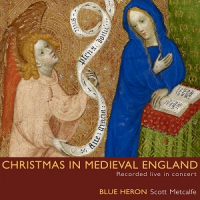 Blue Heron, Scott Metcalfe
Blue Heron, Scott MetcalfeChristmas in Medieval England
Blue Heron Music
2015
Christmas choral music is like port—the older it is the better. It is this quality that makes Boston's Blue Heron's release Christmas in Medieval England so delicious and compelling. No music on this release is more recent than 15th Century. In our shared Western Civilization, the medieval period is typically considered to have been between 476 AD (the deposition of Romulus Augustus) to 1400. The music of the period began started with chanting in Roman Catholic Church services during the reign of Pope Gregory I. From this point, Western evolved into an art form with the development of music notation. The only European Medieval repertory that survives from before about 800 is the monophonic liturgical plainsong of the Roman Catholic Church, the central tradition of which was called Gregorian chant. Alongside these traditions of sacred and church music there existed a vibrant tradition of secular song.
Chorus master Scott Metcalfe programs nothing more recent than the 15th Century. Opening the recital is the 13th Century Franco-German "Veni, Veni Emanuel." The reader will recognize this as "O Come, O Come, Emanuel" and should be stunned at the age of the melody, which may very well have originated well before the 13th Century. The only way to describe this ancient music and its modern performance is sublime. If we take to heart, the teacher's admonition in Ecclesiastes, in Jerome's translation, that nihil sub sole novum nec valet, then we might conclude that this music cannot be bettered and I believe history as revealed such. The program is divided into music for Advent, the Annunciation, Christmas Eve, and Christmas Day. It is a testament to the culture of much of the United States, this music that migrated forth from mainland Europe into Britain in all of her ancient glory.
Tags
PREVIOUS / NEXT
Support All About Jazz
 All About Jazz has been a pillar of jazz since 1995, championing it as an art form and, more importantly, supporting the musicians who make it. Our enduring commitment has made "AAJ" one of the most culturally important websites of its kind, read by hundreds of thousands of fans, musicians and industry figures every month.
All About Jazz has been a pillar of jazz since 1995, championing it as an art form and, more importantly, supporting the musicians who make it. Our enduring commitment has made "AAJ" one of the most culturally important websites of its kind, read by hundreds of thousands of fans, musicians and industry figures every month.



